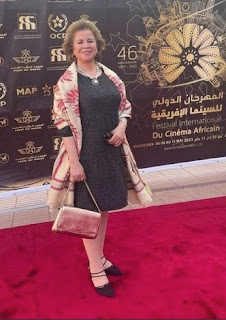at the Khouribga Film Festival in Morocco
(Africine)
Published 29/10/2023. Translation from French by Beti Ellerson. A collaboration with Africine.org and the African Women in Cinema Blog. Image africine: Azza El Hosseiny at the Khouribga Film Festival.
Africiné - La parole aux Égyptiennes invitées à Khouribga : Azza El Hosseiny. http://africine.org/entretien/la-parole-aux-egyptiennes-invitees-a-khouribga-azza-el-hosseiny/15847
They are delighted to be invited to the African cinema festival which took place in Khouribga, from May 6 to 13, 2023. The event was created in 1977 by the dean of Moroccan critics, the late Nour Eddine Sail (inspired by the late Tunisian Tahar Chériaa, founder of the Carthage Festival, Tunis in 1966). The Moroccan festival is held annually.
Far from being a tourist region, Khouribga is known for the production of phosphate. While its focus on African cinemas enlivens the city and ridding it of phosphate dust. The city has become an unmissable annual gathering and a meeting place for African cinema professionals par excellence.
On this occasion, a meeting with two women in cinema took place in this context: Azza El Hosseiny and Marwa Al Cherkawi, two Egyptian artists invited to take part in this 23rd edition.
To find out more about women as cinema professionals, Africiné magazine connected with Azza El Hosseiny.
Azza El Hosseiny, Egyptian actress and filmmaker, is the director of the Luxor African Cinema Festival (LAFF), in Egypt (organized since 2012 by the Independent Shabab Foundation - ISF). Azza participated in the colloquium entitled “Cinema: memory and perspective”. These works have the slogan “Our cinema must speak to its time…Our cinema must resist time.”
Participation in the Khouribga 2023 colloquium
Safeguarding cinematographic memory
AE-H: We must think seriously about the importance of finding a way to safeguard cinematographic memory. Due to the lack of a film library specific to African cinema, foreign, European and American institutions take on the responsibility to do so.
Unfortunately, we are not the ones engaged in the the archival of our films. So we must create an African film library of our own, in order to archive our artistic heritage, including, fiction films and documentaries. This must be done in cooperation with the African Union [based in Addis Ababa] as the institution responsible for safeguarding African identity with all its components, which includes cinema.
We must work on digitizing the archives. It is also important to restore the most important films in our cinematic history in order to give new generations the opportunity to see them, because it is through films that we can know so much about our past, our customs, our culture—even the old streets and places of habitation.
The women and cinema
AE-H: Well, I prefer not to talk in terms of gender or sexism in cinema. This is a job that women do as any other kind of work; of course it has its own specificities. I cite the example of Egypt where women have been integrated within this environment for a very long time, as actresses then as directors, until they became filmmakers in their own right. They are present in all areas related to the production of a film work. The number of women who have chosen to go behind the camera is definitely increasing, despite the constraints that can impede their work.
By mastering these tools they become professionals in the field. Hence, by choosing this profession she is the one who must assume responsibility for her choice.
Women’s place in an environment which for a long time has been male-dominated
AE-H: I confirm this thesis, because women have demonstrated that they are capable of ensuring and taking responsibility for their choices and they have met the challenge of being a women and a filmmaker.







